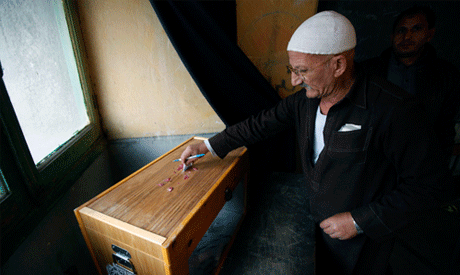
Several political figures have reiterated calls for the Supreme Council of the Armed Forces (SCAF) to allow foreign monitoring of the upcoming parliament elections.
The military council said earlier this year it would not permit any foreign monitoring of elections for the Lower and Upper Houses of Parliament, scheduled for November 2011 and January 2012 respectively.
However, it said civil society organisations, both national and international, would be allowed to “observe the election process.”
Given that ousted Egyptian president Hosni Mubarak used to deem the notion of foreign monitoring of elections as interference in the country’s affairs, many thought SCAF would reconsider such a stance following January’s uprising which brought to an end the autocrat's 30-year rule.
“The recent agreement between SCAF and 13 political parties neither allowed nor prohibited foreign monitoring of elections,” said Gamal Eid, the executive director of the Arabic Network for Human Rights.
“The role of civil society is to help observers in their job to ensure credibility and trust.”
The debate was reignited after five Egyptian election officials, including Abdel-Moez Ibrahim, head of the Supreme Elections Committee, flew to Poland to observe Sunday’s parliamentary elections.
“Field Marshal Mohamed Hussein Tantawi (Egypt’s de facto ruler) discussed the matter during his meeting with former United States president Jimmy Carter,” said George Ishaq, a staunch critic of Mubarak’s rule and former leader of the Kefaya (Enough) movement.
“Foreign monitoring will prove that Egypt has no intention of rigging votes.”
Egyptian architect and political activist Mamdouh Hamza joined the chorus criticising SCAF for refusing to respond to one of the recurring demands of January’s revolution, which came in the wake of notorious parliamentary elections in late 2010.
“I don’t see any reason for rejecting foreign observers. Our upcoming elections should be totally transparent following the revolution,” he said.
“Monitoring elections does not mean controlling it, which is totally rejected. The world witnessed our great revolution and they should also witness the first real democratic process, which will make us proud.
“The military council and the government will be also credited for that after we got rid of the dictator Mubarak,” he added.
Egyptian presidential hopeful Mohamed ElBaradei also said earlier this year that Egypt’s refusal to allow foreign monitoring of elections underlines “the erroneous understanding of interference in the country's sovereignty.”
No comments:
Post a Comment